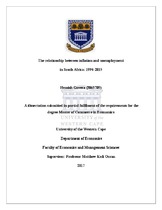The relationship between inflation and unemployment
Abstract
The nature of the relationship between inflation and unemployment has implications for the appropriate
conduct of monetary policy. However, the question as to whether the traditional Phillips
curve relationship holds true remains debatable despite advances in both theoretical and empirical
evidence. This study revisits this debate for South Africa by examining data on unemployment,
the repo interest rate and core CPI for the period from 1994Q1 to 2015Q4. This was in the light of
recent developments in both theoretical and empirical Phillips curve literature. The research
employed a hybrid version of the NKPC and various econometric techniques. The Augmented
Dickey-Fuller test was used to examine the unit root properties of the data series. The Johansen
cointegration technique was applied to test for cointegration among the variables. The research
derived and estimated an error correction model for inflation. The model results demonstrated that
the repo interest rate is statistically significant in explaining inflation. The VECM was derived and
estimated to examine both short-run and long-run relationships among the variables. The results
confirmed the existence of a positive but insignificant long-run relationship between unemployment
and inflation. The study used the Granger causality test to ascertain the nature of causality
among the variables. The research established the presence of unidirectional Granger causality
running from core CPI to unemployment. Forecast error variance decomposition shows that large
percentages of variations in each variable are attributable to each variable respectively. The
empirical findings are helpful to the understanding of the Phillips curve relationship in South
Africa and emerging economies in general.

